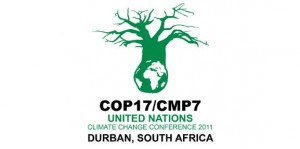Dickinson to Durban » Archive
Legally Binding Agreement at COP17?

(If you’re new to this blog or the discussion on legally binding agreements at international climate negotiations, please see this blog in order to gain some background knowledge). After the two most recent UNFCCC Conferences of the Parties, COP 15 and COP16, some least-developed countries are still holding out for a legally binding commitment at COP17. However, due to political concerns, the concept of a legally bound commitment is viewed differently by each country involved in … Read entire article »
Filed under: Climate Change, Environmental Politics, Key COP17 Issues
Ecofeminism and Climate Change
by Claire Tighe ’13 What is Ecofeminism? What does it have to do with climate change? Listen to my podcast here (click on the “Claire Tighe: Ecofeminism” podcast to listen) or explore this blog to learn more. … Read entire article »
Filed under: Climate Change, Environmental Politics, Student Research
“But it will ruin our economy!”
by Claire Tighe ’13 Does curbing emissions mean compromising potential economic development? In their WorldWatch Report entitled “Renewable Revolution: Low-Carbon Energy by 2030,” Sawin and Moomaw argue that it does not. (Even though simultaneously curbing economic development might not be such a bad thing, considering the effects of the United States’ exponential growth on a very limited aggregation of resources: the natural environment. In fact, less development for industrialized countries might even be preferable considering the projections for dangerous climate change if we continue to function with a “business-as-usual” model for emissions. If you’re curious about the environmental approach claiming that a cap on growth might not be so bad, check out Bill McKibben’s most recent book, Eaarth.) Instead, Sawin and Moomaw claim that “the way forward must be to focus … Read entire article »
Filed under: Carbon Markets, Climate Change, Key COP17 Issues
The Key To International Negotiations?
by Claire Tighe ’13 In order to maintain a livable atmosphere for life on Earth, big polluters such as the United States, need to significantly reduce their greenhouse gas (ghg) emissions. Without either a carbon cap-and-trade system or a carbon tax imposed by the federal government, the future of climate change looks bleak, particularly in relation to the pending international climate change agreements (For a great introduction of the dynamics and concerns of the cap-and-trade system, see Holme Hummel’s slideshow). As economist Nat Keohane presents in his video about cap-and-trade here, a concrete, comprehensive domestic emissions restriction will encourage other international states to create their own policies, or even sign onto a post-Kyoto agreement. If competing countries, such as China, see that the United States has made a commitment to cut carbon, … Read entire article »
Filed under: Carbon Markets, Climate Change, Key COP17 Issues, Summer Reading Responses
Recent Comments